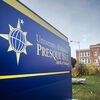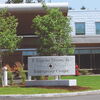Chelsea Wagner: Marketing Hannaford's buy-local program
 Photo / Tim Greenway
Chelsea Wagner (foreground), the “Close to Home” specialist at Hannaford, with Debbie Thurlow, owner of Debbie's Pies in New Gloucester, stocking cookies and pies.
Photo / Tim Greenway
Chelsea Wagner (foreground), the “Close to Home” specialist at Hannaford, with Debbie Thurlow, owner of Debbie's Pies in New Gloucester, stocking cookies and pies.
Hannaford Supermarkets saw its sales volume of locally sourced produce rise 35% last year alone, mirroring a consumer trend toward farm-to-table foods. Though the supermarket had been selling a variety of local foods for years, it felt shoppers may be unaware of that effort. Enter Chelsea Wagner, 23, a specialist for the company's “Close to Home” program, which buys Maine-grown and -produced products.
Hannaford started Close to Home in 2008, but brought Wagner into its Scarborough headquarters a year ago to raise the program's profile among consumers, who she says are increasingly asking for local produce, meat, salsa and other goods. Wagner says the supermarket also is helping farmers by reimbursing some of their cost to comply with federal good agricultural practices, a food safety check necessary before they can sell to the supermarket chain.
Wagner, a Maine native and University of Maine at Orono biology graduate who previously apprenticed at a farm through the Maine Organic Farmers and Gardeners Association, recently talked to Mainebiz about Hannaford's efforts to tap the local food movement and let its customers know it is doing so. Following is an edited version of the conversation.
Mainebiz: What is your role in Hannaford's Close to Home program?
Chelsea Wagner: I bring in new vendors and make marketing materials more visible in stores. It involves labeling in the store to let customers know which are local products [the Close to Home label is under the price].
MB: What types of items, and how many, are in the program?
CW: A wide variety of fresh veggies, cheese, meats, seafood, breads and pastries. We also sell maple syrup, coffee, granola, barbecue sauce, honey, milk, ice cream, pasta sauce, wine, beer, jelly, jams and other items. We sell 5,000 items across our stores in five states: Maine, Massachusetts, New Hampshire, Vermont and New York. In Maine, there are 1,500 items for sale from 750 different producers that are sourced locally, such as potatoes, milk and Nature's Place ground beef from Pineland Farms. That figure does not include our private-brand items we buy locally.
MB: How much of Hannaford's total sales are from local food?
CW: We do not track sales data by local versus elsewhere, but we do know local items are popular. Plus, it would vary greatly by season and by the area, depending on whether or not the store is in a farm belt. Local foods are important to customers. There's so much of an emotional value to it.
MB: How do you define “local?”
CW: Local is a product made or grown in the state where it is sold. Those sales put money back into the state. When in season, 96% of our corn is sourced locally, as is 95% of cider, 67% of squash and pumpkins, and 62% of apples and tomatoes. We would like to do even more. This year we extended the local produce offering into the winter from October or early November by selling local squash, potatoes, apples and cider.
MB: Is there a minimum size a farm or business has to be to sell to you?
CW: Many people think that their business has to be big enough to supply all 187 of our stores. This is not true. We work with small producers that deliver to one or two stores.
MB: Hannaford requires produce suppliers to get U.S. Department of Agriculture certification for good agricultural practices. Are you helping farmers with that annual cost?
CW: Hannaford requires that farmers have a food safety plan in place so we can ensure that we are selling safe, healthy food to our customers. Most audits are between $500 for smaller growers and $1,000 for large growers in the state. Hannaford offers a recurring reimbursement of up to $750 for each local grower to help cover the cost of a successful food safety audit. For smaller growers, that could cover the entire cost. This is up from $300 a couple years ago. This is a significant fund for us, but we believe in supporting small farmers.
Read more










Comments